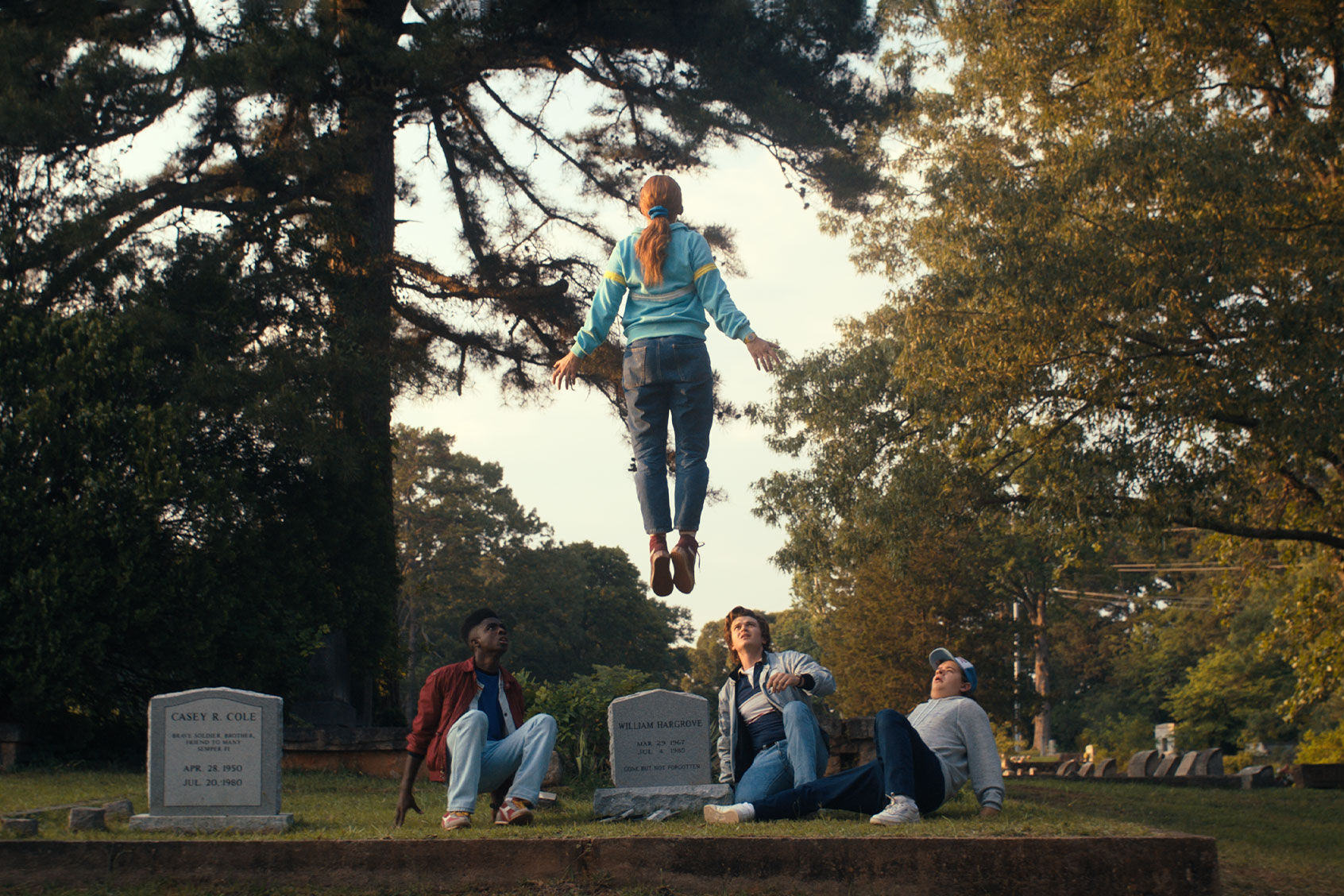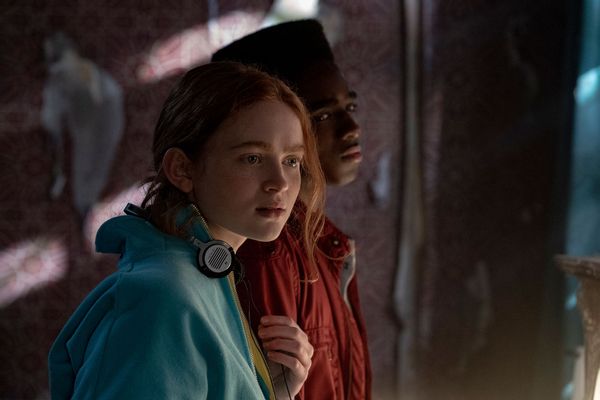
As a Kate Bush fan, I've learned to be grateful for crumbs. Loving the work of a musician who does not really tour will do that to you. There was a rumor that Bush would perform in the 2012 London Olympics, and I stayed up late, watching the closing ceremony, waiting. A recorded remix of her song "Running Up That Hill (Deal with God)" was used in the performance. But that was it.
When "Running Up That Hill" made an appearance on the new season of "Stranger Things," streaming on Netflix, I was surprised. If we had just heard the song through Max's headphones as the character pushes through the high school hallways, if the music was only used once as an indicator of her emotional turmoil, that would have been fine.
But that is not it, not the only scene. From "Stranger Things" to TikTok, Bush is back. And she's here (again) for a whole new generation of listeners, younger than ever before, like my own rising middle-schooler. Why is Kate Bush speaking to us now? And what is it about her and her music that works as a gateway to more and different art?
RELATED: "The enduring resonance of Kate Bush's "Running Up That Hill," 35 years later"
I was a tween who couldn't drive. I had been dropped off at the mall, inevitably by a friend's old brother, and I made a beeline for the record store where the new CD by Kate Bush, and its cover of ruby-red toe shoes, seemed to pulse with color and light. I started with Bush's 1993 release "The Red Shoes," and worked backward through her catalogue. In college, my friend Stephen and I would run through the rugby fields, covered in morning mist, screaming "Heathcliff!" from her debut single "Wuthering Heights," released when she was just 19.
Bush had been "discovered" even younger, when a cassette tape demo she had made with over 50 songs, turned down by multiple record labels, found its way into the hands of Pink Floyd guitarist David Gilmour. She had taught herself the piano at age 11 and used to play an organ in her family's barn. EMI eventually signed her, and like many worthwhile artists, her work was misunderstood and underestimated at first by those with power at the label and beyond.
The song is used again and again as a way to bring Max back, back to safety, back to herself.
But her first album "The Kick Inside" would go on to sell 1 million copies in the United Kingdom. Bush became the first woman to reach No. 1 in the UK with a self-written song. Her brother played on that album. She had written some of the songs when she was as young as 13.
It may be partly this that is attracting kids to Bush's music now. It certainly was part of the attraction for me when I was a teenager. This girl had done it. Maybe I could do it too? So much of childhood is having no power. You can't drive, you can't vote. Your voice is not listened to. Your life experiences — and even your worth — are often disbelieved. Bush gave voice to that teenage longing, those big and valid feelings.
It makes sense that "Running Up That Hill" is used in the fourth season of "Stranger Things," not only as an emotional clue to Max's feelings, but used in another huge, pivotal scene where the girl barely escapes danger.
It's used again and again as a way to bring trauma survivor Max (Sadie Sink) back, back to safety, back to herself; to keep her from the tentacles of the Upside Down, which we know now also captures the past. The 1985 song, from Bush's album "Hounds of Love," is dramatic, desperately sad and catchy, longing so much for empathy from a lover — which isn't going to come — that the singer is willing to swap places, to make a deal with a divine power. It's the embodiment of powerlessness and hope in the face of hopelessness.
Like the "Stranger Things" kids and their love of fantasy and games, many of her early songs were heavily influenced not exactly by living but by reading.
In "Stranger Things," the song accompanies the futility of trying to change the past and outrun trauma, the desperation of childhood and adolescence (perhaps especially for a girl). Something terrible happened to Max's stepbrother and she can't tell the truth about it to hardly anyone. The song is distinctive with a melodic chorus like all of Bush's songs – but with an arrangement of spooky keyboards and pounding drums all its own.
It's no wonder the song has found its way to TikTok, where the opening riffs alone are knowable enough to keep the song surfacing in video after video; that it's reached No.1 on iTunes (a format that of course did not exist when it was written).
Listening to the song now, it feels both old and like the future, like something that has never happened before and also keeps happening. It's haunting. And Max is haunted.

For me, like El mind-busting her way through walls, Kate Bush opened the door to a kind of Upside Down: to a different world.
Despite rocketing up the charts in the '80s, Bush has remained below the radar for some later generations. I never heard "Running Up That Hill" on the radio, not like '80s hits in perpetual rotation like "Call Me" by Blondie and "Take On Me" by Ah-ha. Bush was a dancer and a mime, and many of her videos feature her in a leotard doing interpretative dance, the queen of weirdos who never compromised and like a true visionary artist, was constantly experimenting, even if not everyone always saw the fruits of her labor.
She largely stopped touring in 1979, then at age 55 did a surprise engagement of shows in London. She once took 12 years between albums. The press called her reclusive and enigmatic as she dropped out of the public eye to live her life (she and guitarist Dan McIntosh had a son in 1998; fans didn't know for years).
But from "December Will Be Magic Again" to "King of the Mountain," her work shines with emotion and earnestness. Her songs resonate with a rich inner life, even if, like the "Stranger Things" kids and their love of fantasy and games, many of her early songs were heavily influenced not exactly by living but by reading – the kind of things kids write about when they're well, kids. Or, sheltered. Or, live in a small town like Hawkins.
Want a daily wrap-up of all the news and commentary Salon has to offer? Subscribe to our morning newsletter, Crash Course.
Kate Bush is for real and as "Stranger Things" proves, she's really for everyone. For me, like El mind-busting her way through walls, she opened the door to a kind of Upside Down: to a different world of creativity and art. After Bush, I listened to Peter Gabriel, PJ Harvey, OutKast, St.Vincent. I fell in love with movies like "Mandy" and books like that of Octavia E. Butler and Terri Windling. I learned to make my own world through art.
"Maybe you should start listening to the whole 'Hounds of Love' album," I told my son as we walked to school the morning after finishing "Stranger Things"; he had been humming Kate Bush for days.
"Shouldn't I start listening to Tori Amos?" he said. I've parented a tween long enough to know not to scream with delight, at least not right in front of him.
I hope that "Running Up That Hill" is a similar gateway for its newest, youngest listeners. I hope they take from her songs not only that feelings are OK, but being yourself is too: whatever weird, wild, dreaming person that is. In the '90s, I often felt that Kate Bush was a secret. If you knew, you knew. Someone this good shouldn't be a secret. I hope she opens the gate.
More stories like this







